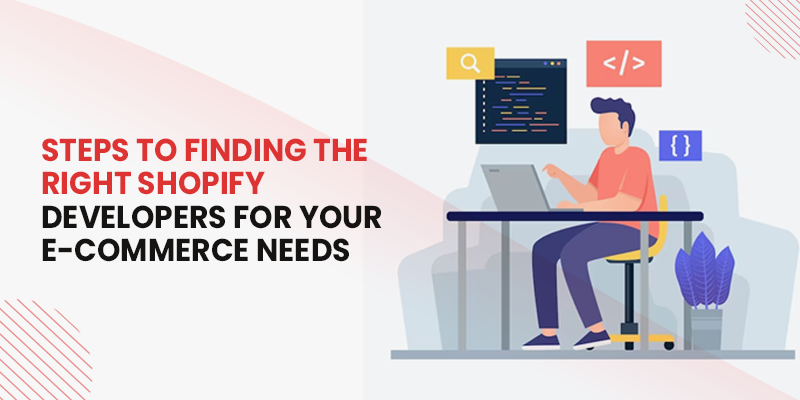Find the Right Shopify Developers for Your E-Commerce Needs in Just 5 Simple Steps

Wondering to take your store online and make your mark on digital platforms but finding an eCommerce expert for your business is getting strenuous?
Finding eCommerce experts to build your website though critical, is a daunting task, especially if you are not familiar with the world of web development.
E-commerce has become a booming industry over the years, and the demand for online shopping is constantly growing at a rapid pace. As more businesses move their operations online, the need for a reliable e-commerce platform is soaring high like never before. Over the years, Shopify has turned to advantage here and so are the Shopify developers.
Shopify is basically, an e-commerce platform that enables businesses of all sizes to sell their products and services online. It is the best option to create a professional store that will represent your brand, engage with your clients and convert well. To get the most out of Shopify it is crucial to find the right Shopify developer. Yes, it is easy to get the hang of Shopify but to deal with its interface it is worth it to outsource a Shopify developer and get your website constructed.
Hence, In this article, we'll go through the steps you should take to find the right Shopify developer for your e-commerce needs.
5 Steps to Find the Right Shopify Developer For Your eCommerce Needs.
You need to work with experienced and skilled developers who can help you customize your store and meet your specific business needs. Go through the steps underneath to hire an eCommerce expert for your business.
1. Determine Your Requirements
Before you start looking for Shopify developers, you need to have a clear understanding of your requirements. What features do you need for your online store? What is your budget? What is your timeline? Do you need any integrations with other tools or services? Once you have a clear understanding of your requirements, you can then search for eCommerce experts who have experience in building Shopify websites. Look for developers who have a good track record of delivering projects similar to yours, and who have a deep understanding of Shopify's features and capabilities.
2. Research E-commerce Experts
Having a clear idea of your requirements will help you narrow down your search and ensure that you find a developer who can deliver on your expectations. It's time to start looking for e-commerce experts who specialize in Shopify development. You can start by searching online for "Shopify developers" or "e-commerce experts." You can also ask for recommendations from other business owners or check out Shopify's Experts Marketplace, where you can find a directory of certified Shopify experts.
3. Check Their Portfolio and Reviews
Once you have a list of potential Shopify developers, the next step is to check their portfolios and reviews. A good developer should have a portfolio of past projects that demonstrate their expertise in Shopify development. Look for examples of stores that they have designed and developed, and check to see if they have experience working with businesses similar to yours. When reviewing a Shopify developer's portfolio, pay attention to the design of the websites they have built. Make sure the websites are visually appealing, easy to navigate, and optimized for mobile devices. Also, check the functionality of the websites, such as the checkout process, etc.
4. Check for Testimonials and Reviews
Testimonials and reviews are a great way to gauge the credibility and reliability of a Shopify developer. Check for testimonials on the developer's website, and read reviews on third-party websites such as Google My Business and Clutch to get a sense of their reputation and the quality of their work. Look for Shopify developers who have positive reviews and testimonials from their previous clients. If possible, contact some of the developer's previous clients to get a better understanding of their experience working with the developer.
5. Contact Developers to Conduct Interviews
Once you have shortlisted a few Shopify developers based on their portfolios and reviews, it's time to conduct interviews. The interview is an opportunity to discuss your e-commerce requirements with the developer, and to gauge their understanding of your project. Contact each developer and interview them on experience, pricing, and availability. Be sure to ask them about their process and how they plan to work with you to achieve your goals.
During the interview, ask the Shopify developer questions such as:
- What is your experience with Shopify?
- What is your approach to building an e-commerce website?
- Can you provide a breakdown of the development process?
- How do you handle changes to the project scope?
- What is your pricing model?
Communication and availability are critical when working with a Shopify developer. Make sure the developer is available to communicate with you via email, phone, or instant messaging. Also, discuss the frequency of updates and the reporting structure. By asking these questions, you can get a better understanding of the developer's approach to Shopify development, and their ability to deliver a project that meets your requirements. This will help you get a sense of whether the developer is a good fit for your business.
Make an Informed Decision… After you've evaluated each developer and compared their skills, experience, and pricing, it's time to make your decision. Choose the developer who you believe will best meet your requirements, and who you feel confident enough to deliver high-quality work. Make sure to agree on the terms and conditions of your engagement before starting work, including the scope of work, payment terms, and timelines.
To sum things up, finding the right Shopify developer for your e-commerce needs requires a bit of research and evaluation. By following these steps, you can identify experienced e-commerce experts who specialize in Shopify development, and who can help you create a successful online store that meets your business goals.

